Unit 4 Don’t eat in class.SectionAGrammar-3cSectionB2a-2c课件2023-2024学年度人教版英语七年级下册
文档属性
| 名称 | Unit 4 Don’t eat in class.SectionAGrammar-3cSectionB2a-2c课件2023-2024学年度人教版英语七年级下册 |
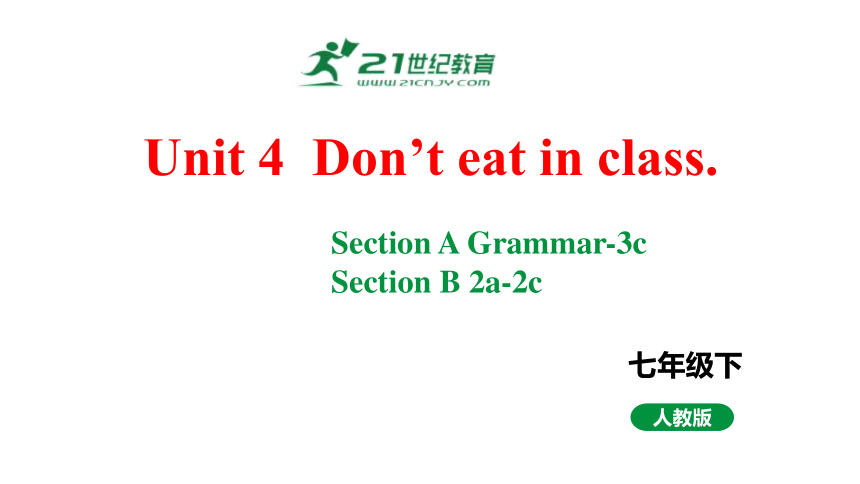
|
|
| 格式 | pptx | ||
| 文件大小 | 3.6MB | ||
| 资源类型 | 试卷 | ||
| 版本资源 | 人教新目标(Go for it)版 | ||
| 科目 | 英语 | ||
| 更新时间 | 2024-03-08 00:00:00 | ||
图片预览

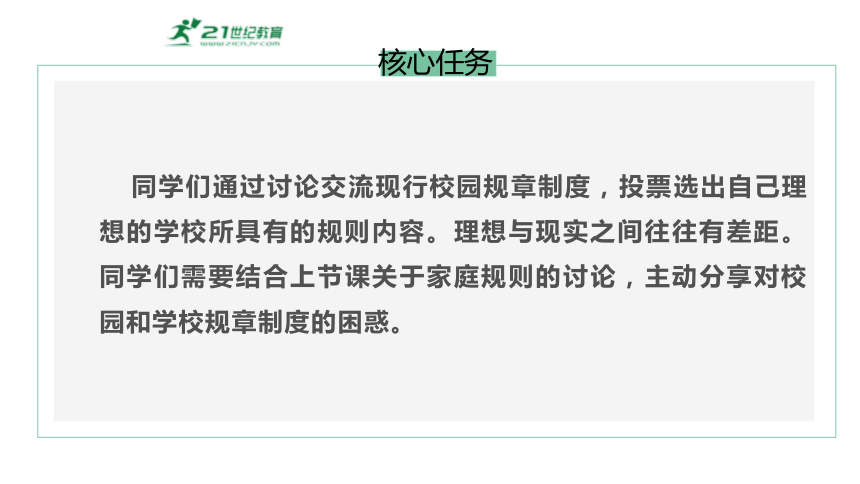
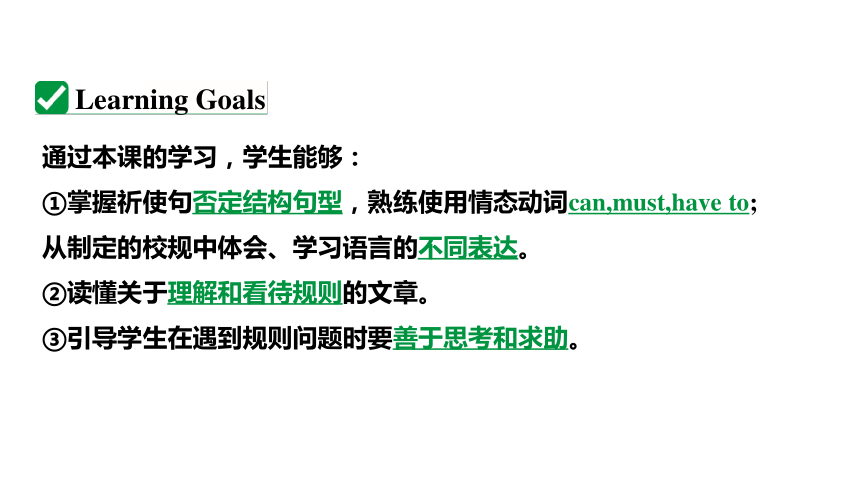
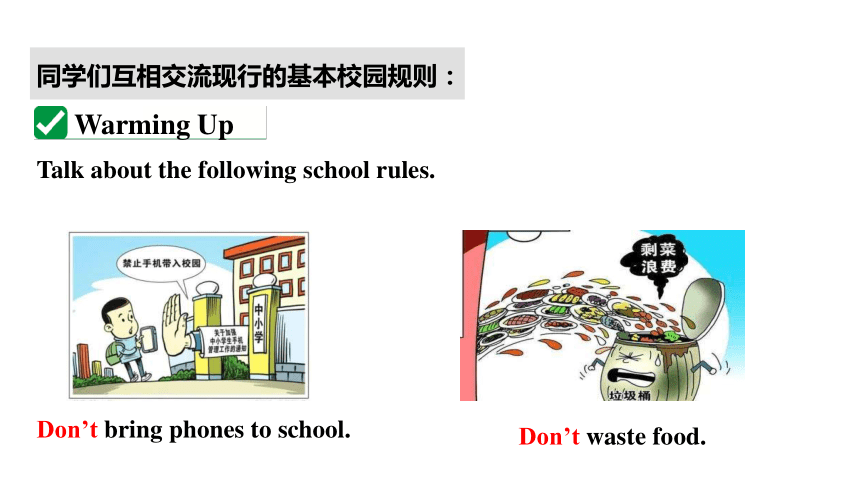
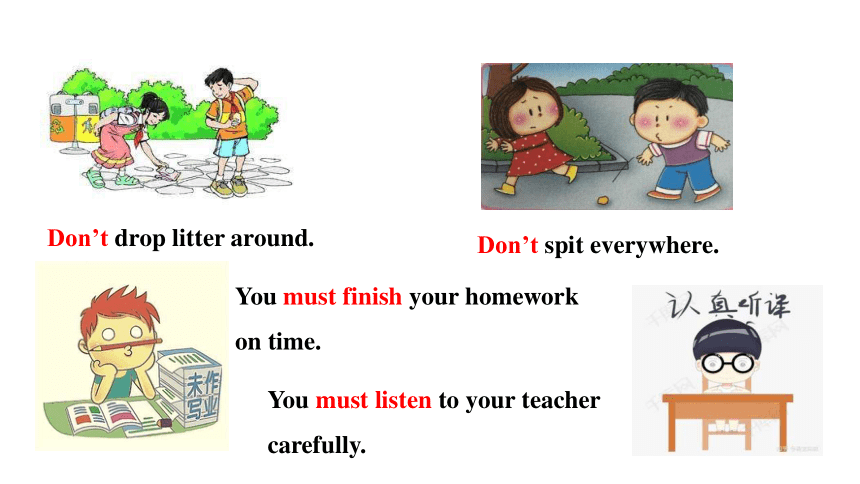
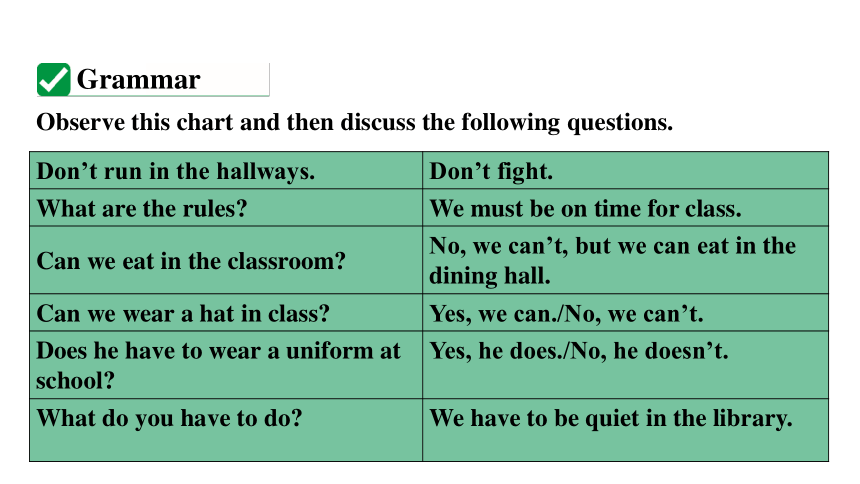
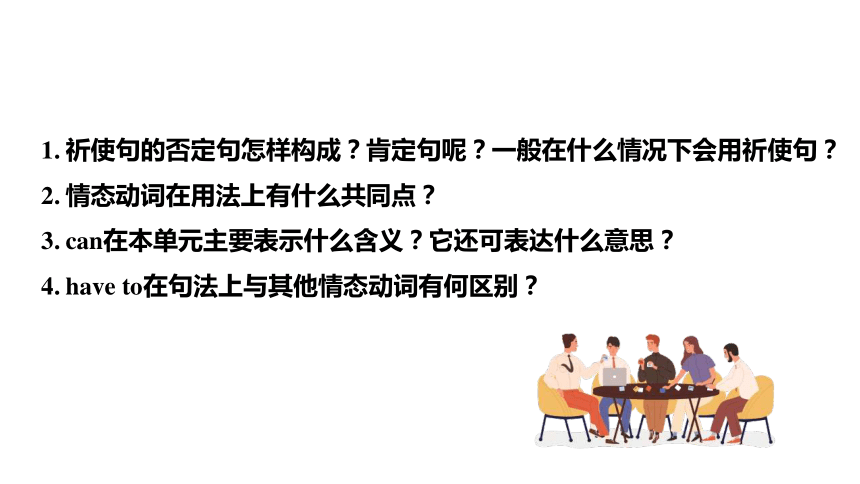
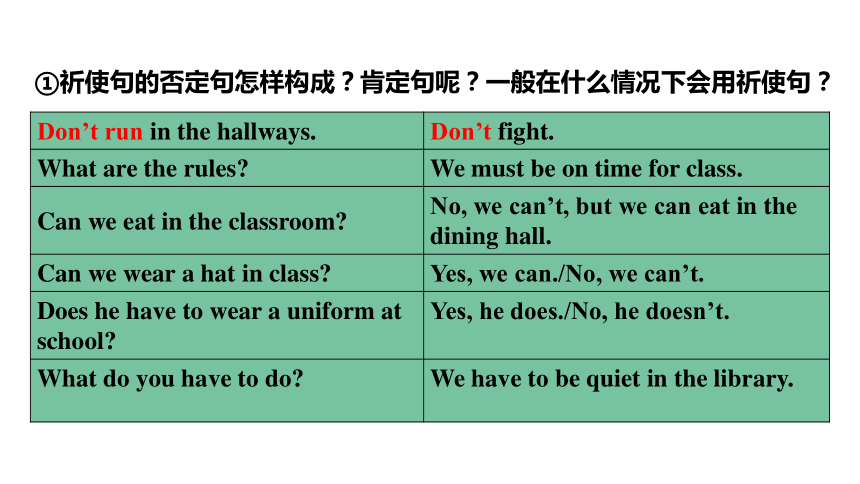
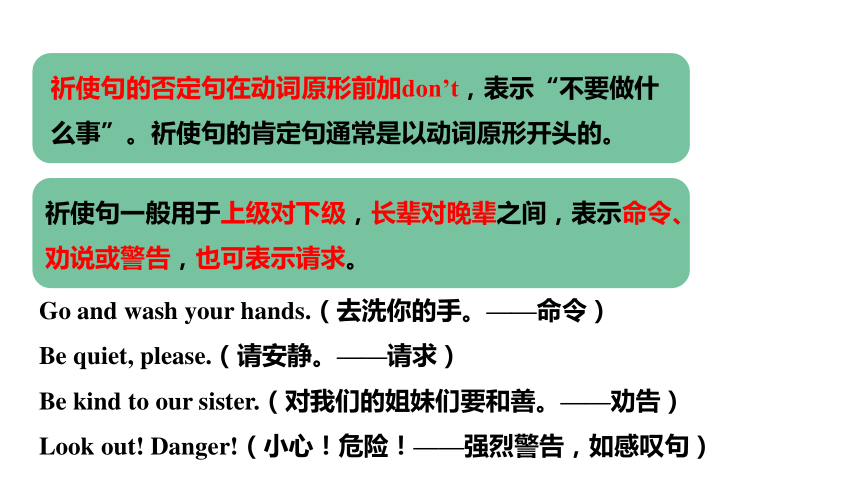
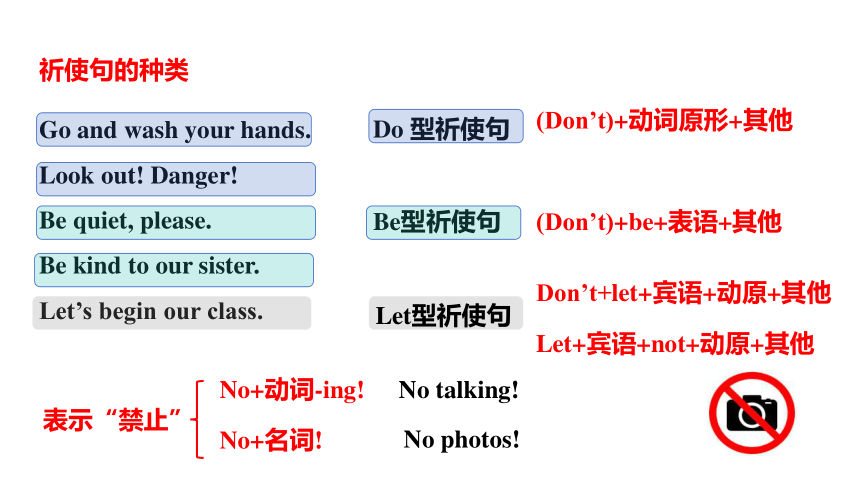
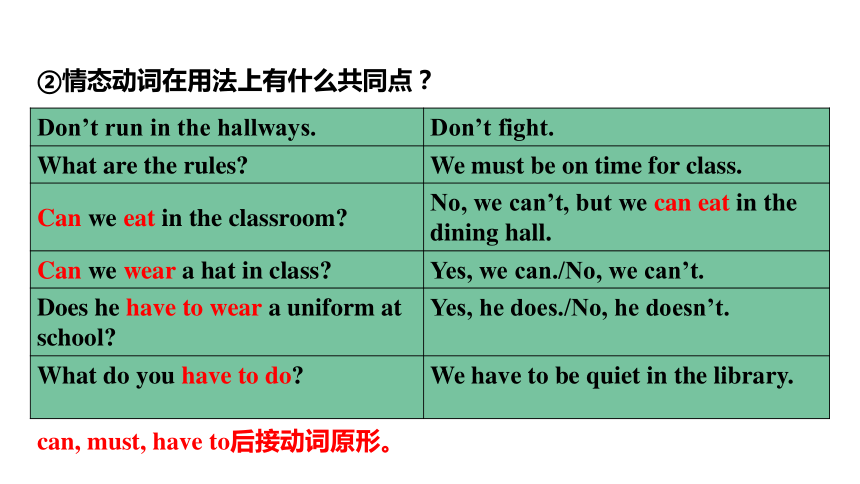
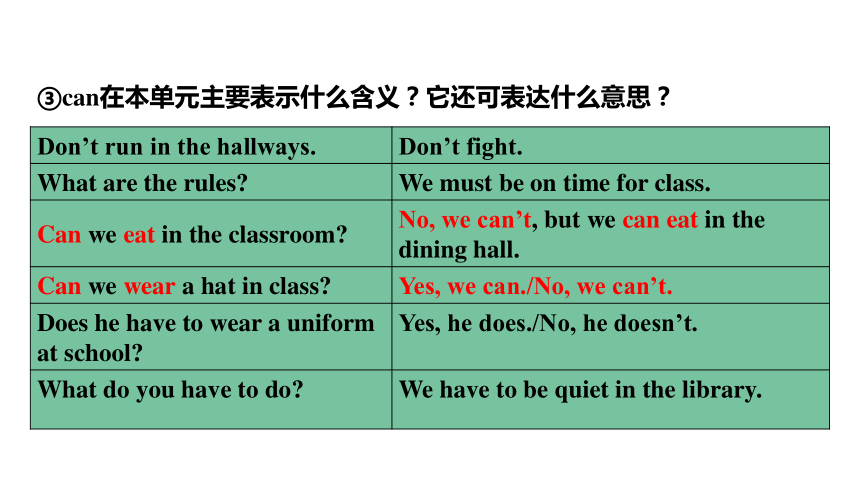
文档简介
(共48张PPT)
Section A Grammar-3c
Section B 2a-2c
七年级下
人教版
Unit 4 Don’t eat in class.
同学们通过讨论交流现行校园规章制度,投票选出自己理想的学校所具有的规则内容。理想与现实之间往往有差距。同学们需要结合上节课关于家庭规则的讨论,主动分享对校园和学校规章制度的困惑。
核心任务
Learning Goals
通过本课的学习,学生能够:
①掌握祈使句否定结构句型,熟练使用情态动词can,must,have to;从制定的校规中体会、学习语言的不同表达。
②读懂关于理解和看待规则的文章。
③引导学生在遇到规则问题时要善于思考和求助。
Talk about the following school rules.
Don’t bring phones to school.
Don’t waste food.
Warming Up
同学们互相交流现行的基本校园规则:
Don’t drop litter around.
Don’t spit everywhere.
You must finish your homework on time.
You must listen to your teacher
carefully.
Observe this chart and then discuss the following questions.
Don’t run in the hallways. Don’t fight.
What are the rules We must be on time for class.
Can we eat in the classroom No, we can’t, but we can eat in the dining hall.
Can we wear a hat in class Yes, we can./No, we can’t.
Does he have to wear a uniform at school Yes, he does./No, he doesn’t.
What do you have to do We have to be quiet in the library.
Grammar
祈使句的否定句怎样构成?肯定句呢?一般在什么情况下会用祈使句?
情态动词在用法上有什么共同点?
can在本单元主要表示什么含义?它还可表达什么意思?
have to在句法上与其他情态动词有何区别?
①祈使句的否定句怎样构成?肯定句呢?一般在什么情况下会用祈使句?
Don’t run in the hallways. Don’t fight.
What are the rules We must be on time for class.
Can we eat in the classroom No, we can’t, but we can eat in the dining hall.
Can we wear a hat in class Yes, we can./No, we can’t.
Does he have to wear a uniform at school Yes, he does./No, he doesn’t.
What do you have to do We have to be quiet in the library.
祈使句的否定句在动词原形前加don’t,表示“不要做什么事”。祈使句的肯定句通常是以动词原形开头的。
祈使句一般用于上级对下级,长辈对晚辈之间,表示命令、劝说或警告,也可表示请求。
Go and wash your hands.(去洗你的手。——命令)
Be quiet, please.(请安静。——请求)
Be kind to our sister.(对我们的姐妹们要和善。——劝告)
Look out! Danger!(小心!危险!——强烈警告,如感叹句)
祈使句的种类
Go and wash your hands.
Look out! Danger!
Be quiet, please.
Be kind to our sister.
Let’s begin our class.
Do 型祈使句
Be型祈使句
Let型祈使句
(Don’t)+动词原形+其他
(Don’t)+be+表语+其他
Don’t+let+宾语+动原+其他
Let+宾语+not+动原+其他
表示“禁止”
No+动词-ing!
No+名词!
No talking!
No photos!
Don’t run in the hallways. Don’t fight.
What are the rules We must be on time for class.
Can we eat in the classroom No, we can’t, but we can eat in the dining hall.
Can we wear a hat in class Yes, we can./No, we can’t.
Does he have to wear a uniform at school Yes, he does./No, he doesn’t.
What do you have to do We have to be quiet in the library.
②情态动词在用法上有什么共同点?
can, must, have to后接动词原形。
Don’t run in the hallways. Don’t fight.
What are the rules We must be on time for class.
Can we eat in the classroom No, we can’t, but we can eat in the dining hall.
Can we wear a hat in class Yes, we can./No, we can’t.
Does he have to wear a uniform at school Yes, he does./No, he doesn’t.
What do you have to do We have to be quiet in the library.
③can在本单元主要表示什么含义?它还可表达什么意思?
can在本单元的主要意义是“能够;允许”,还可表示“能力、推测” 。
① 表“能力”
I can speak English well now .我现在说英语很好。
②表“许可”,可表示请求他人许可或许可他人(could 表示委婉语气)
—Could I use your bike —Yes, you can.
③表“推测”
It can’t be Mr. Li.
Don’t run in the hallways. Don’t fight.
What are the rules We must be on time for class.
Can we eat in the classroom No, we can’t, but we can eat in the dining hall.
Can we wear a hat in class Yes, we can./No, we can’t.
Does he have to wear a uniform at school Yes, he does./No, he doesn’t.
What do you have to do We have to be quiet in the library.
④have to在句法上与其他情态动词有何区别
have to 表示客观上的“不得不”,与其他情态动词相比,①它有人称和数的变化 ②其一般疑问句需借助 助动词
He has to wear a uniform at school.
Does he have to wear a uniform at school
Yes, he does.
No, he doesn’t (have to).
He doesn’t have to wear a uniform at school.
对比点 must have to
1.表“必须” (主观看法)必须; 无时态 (客观需要)不得不;
多种时态
2.疑问句 Must I... Yes, you must. (一定) No, you needn’t / you don’t have to. (不必) Do you have to go today
Yes, we do.
You don’t have to worry about that.
Look at the pictures in 3a and answer the questions.
1
2
3
4
2. What can’t students do in picture 2
1. Can we talk loudly in the library
3. What about picture 3
4. Is there anything else students can’t do on picture 4
同学们互相交流,确定图书馆需要遵守的规则:
3a Write the rules for the school library.
1
2
3
4
Library Rules
1. __________________________________
2. __________________________________
3. __________________________________
4. __________________________________
Don’t talk.
Don’t eat in the library.
Don’t listen to music in the library.
Don’t take photos in the library.
3b Use the words to make questions about the rules. Then write answers according to your school.
Be quiet
Q: Does she have to be quiet in the library (she/have to/in the library)
A: Yes, she does.
Eat
Q:__________________________________
(he/have to/in the dining hall)
A:__________________________________
Does he have to eat in the dining hall
Yes, he does.
Q:_________________________________
(we/can/in the hallways)
A:_________________________________
Listen to music
Can we listen to music in the hallways
No, we can’t.
Wear a hat
Q:_________________________________
(we/can/in the classroom)
A:_________________________________
Can we wear a hat in the classroom
No, we can’t.
3c Make up five cool rules for your dream school. Share your rules with the class. Your classmates vote for the Coolest School!
1. We can eat in class.
2. We don’t have to come to school every day.
3. ...
At my dream
school, we don’t have
to come to school
every day. We...
Post-learning
同学们票选出理想学校会有的制度:
2a When you are unhappy about something, who do you like to talk to
parents
friends
teacher
someone else
Talk with your partners and then some of you are expected to share your own opinions with us all.
实际生活中,同学们对一些必须遵守的规则有困惑:
Everyone feels unhappy sometimes, but we need to know how to deal with it. One girl called Molly feels unhappy. Look at the picture. Can you guess what happened to her
She is worried about her class.
She has difficulty in her homework.
...
Pre-reading
Molly分享了个人经历,详细讲述了自己对一些规则的困惑:
Let’s skim!
Read the passage in 30 seconds and find out why Molly feels unhappy.
There are too many rules for her!
While-reading
2b Read the letters. Underline the rules for Molly. Then fill in the chart.
Molly’s rules
1. She has to get up at six o’clock every morning and make her bed.
2. She can’t leave dirty dishes in the kitchen.
3. She can’t be late for school.
4. She can’t be noisy at school.
5. She can’t eat in class.
Let’s scan!
Molly’s rules
7. She has to do her homework first.
8. She can play basketball only on weekends.
9. She has to read a book before she can watch TV.
10. She has to go to bed before 10:00.
6. She can’t play basketball after school.
What do you think of Molly’s rules Are these rules fair or unfair
Talk the following questions with your partners and then some of you are expected to share your own opinions with us all.
1 Which rules do you think are fair
2 Which rules do you think are unfair
3 If you were Dr. Know, what would you say to Molly
Read the second letter and underline Dr. Know’s opinion.
Parents and schools are sometimes strict, but remember, they make rules to help us. We have to follow them.
Dr. Know advises her that she can think about the rules in other way.
Dear Dr. Know,
There are too many rules!① At 6:00 a.m., my mom says, “Get up now and make your bed!” After breakfast, my mom always says, “Don’t leave
the dirty dishes in the kitchen!②” After that, I run to school because I
can’t be late. At school, we have more rules—don’t be noisy, don’t eat in class, ...
铺床
adj.脏的
n.厨房
adj. 更多的;在这里是many的比较级
be + adj. 表示一种状态
全知博士;万事通博士;Dr.= doctor 博士
书信称呼Dear…, 称呼后用逗号,不用冒号。
第一句为核心句
My dad says I can’t play basketball after school because I must do my homework. I can play only on weekends. After dinner, I can’t relax either.③ I must read a book before I can watch TV. But I have to go to
bed before 10:00. Rules, rules, rules! It’s terrible! What can I do, Dr. Know
Molly Brown, New York
adj.非常讨厌的;可怕的
结束前有明显求助的句子
看书
Dear Molly,
I know how you feel. People always tell us, “Don’t do this!” or “You can’t do that!” But think about it, Molly. There are a lot of things you can do. You can play basketball on weekends. You can watch TV after you read a book. Parents and schools are sometimes strict, but remember, they make rules to help us.④ We have to follow them.
Good luck!
Dr. Know
v.感受;觉得
祝你好运;luck n. 运气;lucky adj. 幸运的
2c Read the letters again and complete the sentences with have to/must, can or can’t.
1. Molly _____ play basketball on school days, but she_____ play it on weekends.
2. Molly __________ do her homework first when she gets home.
3. Molly __________ read a book after dinner before she_____ watch TV.
4. At school, Molly _____be noisy or eat in class.
5. Parents and schools make rules to help students. So students ___________follow the rules.
can’t
can
has to/must
has to/must
can
can’t
have to/must
Post-reading
太多(修饰可数名词) ______________________
前往 ______________________
放松自己 ______________________
看书 ______________________
对某人/事严格 ______________________
记得去做/做过某事 ______________________
祝你好运! ______________________
too many
leave for
relax oneself
read a book
be strict with sb./ about sth.
remember to do/doing sth.
Key Phrases
Good Luck!
1.There are too many rules!
辨析:too much;too many;much too
短语 意思 用法 例句
too many
too much
much too
太多
太多
太……
There are too many books.
There is too much water.
He’s much too young.
修饰可数名词复数
修饰不可数名词
后跟adj.或adv.
Language Points
Instant Training
1. Eating _____ sugar is not only bad for our teeth, but also makes us fat.
A. too many B. too much C. much too
2. Don't take _____ oranges.Two oranges are enough to make a cup of juice.
A. too many B. too much C. much too
3. Tom ran _____ fast and David could hardly catch up with him.
A. too many B. much too C. too much
B
A
B
2.Don’t leave the dirty dishes in the kitchen!
leave the dirty dishes in the kitchen
leave 在此处作为动词,表示“留下;剩下”。
Please leave the book on your desk.
请把书留在你们的课桌上。
leave 还可以表示“离开”; leave for 前往
I’m leaving for Beijing tomorrow.
我明天要去北京。
把脏餐具留在厨房里
Instant Training
1. 我六点起床,所以七点可以去上学。
I get up at 6 a.m. so I can ____________ school at 7 a.m.
2. 在网上留下太多个人信息是危险的。
It’s dangerous to _______much personal information on the Internet.
leave for
leave
3.After dinner, I can’t relax either.
①relax v. 放松;休息。既可作及物动词也可作不及物动词。
relax oneself “放松自己”
I’ll only relax when I know you’re safe.
我只有知道你安然无恙才会放心。
②副词 either 表示 “也”,用于否定句句末,用法与表示肯定或陈述的副词too相似;可用逗号与语句的主题隔开。
My father can’t speak English. My mother can’t (speak it), either.
Instant Training
1. —I often feel nervous(紧张) when speaking in public.
—Don’t worry. Just _______.
A. relaxing B. relax C. relaxed
2. 杰克不听老师的话。史蒂夫也没有耐心地听老师讲课。
Jack doesn’t listen to teachers patiently. Steve doesn’t listen to teachers patiently, _________.
B
either
4.Parents and schools are sometimes strict, but remember, they make rules to help us
①strict adj. 严格的;严厉的
be strict with sb. “对某人严格” be strict about sth. “对某事严格”
She’s very strict about things like homework.
她对作业之类的事要求非常严格。
They were always very strict with their children.
他们对子女一向十分严格。
②remember v. 记住;记起
remember to do sth. 记得去做某事
remember doing sth. 记得做过某事
Please remember to send the letter for me.
请记住为我发这封信。
I don’t remember eating such food somewhere .
我不记得在哪里吃过这种食物
Instant Training
1. Although my mother _______ me in my study, she gives me a lot of freedom(自由) in life.
A. is strict with B. is different from C. is good for
2. —Olivia, do you know where my watch is
—Mom, I remember ________ it on the dining table, next to the cups.
A. to see B. seeing C. saw
A
B
Exercises
听完Molly的分享,Tom也主动发言。他首先提了日常要遵守的规则:
1. 我必须按时到校。
I must ______ _____ school ___ _____.
2. 我不能把我的电子游戏带到学校。
I can’t _____ my computer game ___ school.
3. 周工作日我必须早起。
I _____ ___ get up early on weekdays.
arrive at on time
bring to
have to
4. 不要在走廊里乱跑。
______ ____ in the hallways.
5.我必须遵守家庭规则。
I must _______ _______ _______ _______ .
6.不要把脏衣服扔房间里。
_______ _______ the _______ _______ in the room.
7.我上床睡觉前总不得不看看书。
I always have to_______ _______ _______going to bed.
follow the family rules
Don’t leave dirty clothes
read a book
Don’t run
1.Parents and schools must be s _______ with me.
2. I don’t think that I have to go to bed b _______ ten o’clock.
3. I’m not good at helping my mother m _______ dinner
4. I have to play guitar outside. My parents think the room is too n_______ .
5.It is t_______ for me to break the rules.
efore
trict
ake
oisy
errible
接着Tom表达了自己对一些规则的困惑:
1.Passage: A letter to ask for help about rules and a letter to help out
2.Words and Expressions:
dirty, kitchen, more, noisy, relax, read, terrible, feel, strict, remember,
follow, luck, make one’s bed, be strict (with sb.), follow the rules
3.Key sentences:
① There are too many rules!
② Don’t leave the dirty dishes in the kitchen!
Summary
The rules for Molly
At 6:00 a.m.: get up & make bed
After breakfas: leave the dirty dishes in the kitchen
After that: run school
SCHOOL
don' t be noisy
don' t eat in class
DAD:
After school: homework, basketball on weekends
After dinner: can' t relax,
, watch TV
go to bed before 10:00
read a book
MOM:
Talk with your parents about your family rules. Tell them what do you think of those rules.
实践与拓展
Section A Grammar-3c
Section B 2a-2c
七年级下
人教版
Unit 4 Don’t eat in class.
同学们通过讨论交流现行校园规章制度,投票选出自己理想的学校所具有的规则内容。理想与现实之间往往有差距。同学们需要结合上节课关于家庭规则的讨论,主动分享对校园和学校规章制度的困惑。
核心任务
Learning Goals
通过本课的学习,学生能够:
①掌握祈使句否定结构句型,熟练使用情态动词can,must,have to;从制定的校规中体会、学习语言的不同表达。
②读懂关于理解和看待规则的文章。
③引导学生在遇到规则问题时要善于思考和求助。
Talk about the following school rules.
Don’t bring phones to school.
Don’t waste food.
Warming Up
同学们互相交流现行的基本校园规则:
Don’t drop litter around.
Don’t spit everywhere.
You must finish your homework on time.
You must listen to your teacher
carefully.
Observe this chart and then discuss the following questions.
Don’t run in the hallways. Don’t fight.
What are the rules We must be on time for class.
Can we eat in the classroom No, we can’t, but we can eat in the dining hall.
Can we wear a hat in class Yes, we can./No, we can’t.
Does he have to wear a uniform at school Yes, he does./No, he doesn’t.
What do you have to do We have to be quiet in the library.
Grammar
祈使句的否定句怎样构成?肯定句呢?一般在什么情况下会用祈使句?
情态动词在用法上有什么共同点?
can在本单元主要表示什么含义?它还可表达什么意思?
have to在句法上与其他情态动词有何区别?
①祈使句的否定句怎样构成?肯定句呢?一般在什么情况下会用祈使句?
Don’t run in the hallways. Don’t fight.
What are the rules We must be on time for class.
Can we eat in the classroom No, we can’t, but we can eat in the dining hall.
Can we wear a hat in class Yes, we can./No, we can’t.
Does he have to wear a uniform at school Yes, he does./No, he doesn’t.
What do you have to do We have to be quiet in the library.
祈使句的否定句在动词原形前加don’t,表示“不要做什么事”。祈使句的肯定句通常是以动词原形开头的。
祈使句一般用于上级对下级,长辈对晚辈之间,表示命令、劝说或警告,也可表示请求。
Go and wash your hands.(去洗你的手。——命令)
Be quiet, please.(请安静。——请求)
Be kind to our sister.(对我们的姐妹们要和善。——劝告)
Look out! Danger!(小心!危险!——强烈警告,如感叹句)
祈使句的种类
Go and wash your hands.
Look out! Danger!
Be quiet, please.
Be kind to our sister.
Let’s begin our class.
Do 型祈使句
Be型祈使句
Let型祈使句
(Don’t)+动词原形+其他
(Don’t)+be+表语+其他
Don’t+let+宾语+动原+其他
Let+宾语+not+动原+其他
表示“禁止”
No+动词-ing!
No+名词!
No talking!
No photos!
Don’t run in the hallways. Don’t fight.
What are the rules We must be on time for class.
Can we eat in the classroom No, we can’t, but we can eat in the dining hall.
Can we wear a hat in class Yes, we can./No, we can’t.
Does he have to wear a uniform at school Yes, he does./No, he doesn’t.
What do you have to do We have to be quiet in the library.
②情态动词在用法上有什么共同点?
can, must, have to后接动词原形。
Don’t run in the hallways. Don’t fight.
What are the rules We must be on time for class.
Can we eat in the classroom No, we can’t, but we can eat in the dining hall.
Can we wear a hat in class Yes, we can./No, we can’t.
Does he have to wear a uniform at school Yes, he does./No, he doesn’t.
What do you have to do We have to be quiet in the library.
③can在本单元主要表示什么含义?它还可表达什么意思?
can在本单元的主要意义是“能够;允许”,还可表示“能力、推测” 。
① 表“能力”
I can speak English well now .我现在说英语很好。
②表“许可”,可表示请求他人许可或许可他人(could 表示委婉语气)
—Could I use your bike —Yes, you can.
③表“推测”
It can’t be Mr. Li.
Don’t run in the hallways. Don’t fight.
What are the rules We must be on time for class.
Can we eat in the classroom No, we can’t, but we can eat in the dining hall.
Can we wear a hat in class Yes, we can./No, we can’t.
Does he have to wear a uniform at school Yes, he does./No, he doesn’t.
What do you have to do We have to be quiet in the library.
④have to在句法上与其他情态动词有何区别
have to 表示客观上的“不得不”,与其他情态动词相比,①它有人称和数的变化 ②其一般疑问句需借助 助动词
He has to wear a uniform at school.
Does he have to wear a uniform at school
Yes, he does.
No, he doesn’t (have to).
He doesn’t have to wear a uniform at school.
对比点 must have to
1.表“必须” (主观看法)必须; 无时态 (客观需要)不得不;
多种时态
2.疑问句 Must I... Yes, you must. (一定) No, you needn’t / you don’t have to. (不必) Do you have to go today
Yes, we do.
You don’t have to worry about that.
Look at the pictures in 3a and answer the questions.
1
2
3
4
2. What can’t students do in picture 2
1. Can we talk loudly in the library
3. What about picture 3
4. Is there anything else students can’t do on picture 4
同学们互相交流,确定图书馆需要遵守的规则:
3a Write the rules for the school library.
1
2
3
4
Library Rules
1. __________________________________
2. __________________________________
3. __________________________________
4. __________________________________
Don’t talk.
Don’t eat in the library.
Don’t listen to music in the library.
Don’t take photos in the library.
3b Use the words to make questions about the rules. Then write answers according to your school.
Be quiet
Q: Does she have to be quiet in the library (she/have to/in the library)
A: Yes, she does.
Eat
Q:__________________________________
(he/have to/in the dining hall)
A:__________________________________
Does he have to eat in the dining hall
Yes, he does.
Q:_________________________________
(we/can/in the hallways)
A:_________________________________
Listen to music
Can we listen to music in the hallways
No, we can’t.
Wear a hat
Q:_________________________________
(we/can/in the classroom)
A:_________________________________
Can we wear a hat in the classroom
No, we can’t.
3c Make up five cool rules for your dream school. Share your rules with the class. Your classmates vote for the Coolest School!
1. We can eat in class.
2. We don’t have to come to school every day.
3. ...
At my dream
school, we don’t have
to come to school
every day. We...
Post-learning
同学们票选出理想学校会有的制度:
2a When you are unhappy about something, who do you like to talk to
parents
friends
teacher
someone else
Talk with your partners and then some of you are expected to share your own opinions with us all.
实际生活中,同学们对一些必须遵守的规则有困惑:
Everyone feels unhappy sometimes, but we need to know how to deal with it. One girl called Molly feels unhappy. Look at the picture. Can you guess what happened to her
She is worried about her class.
She has difficulty in her homework.
...
Pre-reading
Molly分享了个人经历,详细讲述了自己对一些规则的困惑:
Let’s skim!
Read the passage in 30 seconds and find out why Molly feels unhappy.
There are too many rules for her!
While-reading
2b Read the letters. Underline the rules for Molly. Then fill in the chart.
Molly’s rules
1. She has to get up at six o’clock every morning and make her bed.
2. She can’t leave dirty dishes in the kitchen.
3. She can’t be late for school.
4. She can’t be noisy at school.
5. She can’t eat in class.
Let’s scan!
Molly’s rules
7. She has to do her homework first.
8. She can play basketball only on weekends.
9. She has to read a book before she can watch TV.
10. She has to go to bed before 10:00.
6. She can’t play basketball after school.
What do you think of Molly’s rules Are these rules fair or unfair
Talk the following questions with your partners and then some of you are expected to share your own opinions with us all.
1 Which rules do you think are fair
2 Which rules do you think are unfair
3 If you were Dr. Know, what would you say to Molly
Read the second letter and underline Dr. Know’s opinion.
Parents and schools are sometimes strict, but remember, they make rules to help us. We have to follow them.
Dr. Know advises her that she can think about the rules in other way.
Dear Dr. Know,
There are too many rules!① At 6:00 a.m., my mom says, “Get up now and make your bed!” After breakfast, my mom always says, “Don’t leave
the dirty dishes in the kitchen!②” After that, I run to school because I
can’t be late. At school, we have more rules—don’t be noisy, don’t eat in class, ...
铺床
adj.脏的
n.厨房
adj. 更多的;在这里是many的比较级
be + adj. 表示一种状态
全知博士;万事通博士;Dr.= doctor 博士
书信称呼Dear…, 称呼后用逗号,不用冒号。
第一句为核心句
My dad says I can’t play basketball after school because I must do my homework. I can play only on weekends. After dinner, I can’t relax either.③ I must read a book before I can watch TV. But I have to go to
bed before 10:00. Rules, rules, rules! It’s terrible! What can I do, Dr. Know
Molly Brown, New York
adj.非常讨厌的;可怕的
结束前有明显求助的句子
看书
Dear Molly,
I know how you feel. People always tell us, “Don’t do this!” or “You can’t do that!” But think about it, Molly. There are a lot of things you can do. You can play basketball on weekends. You can watch TV after you read a book. Parents and schools are sometimes strict, but remember, they make rules to help us.④ We have to follow them.
Good luck!
Dr. Know
v.感受;觉得
祝你好运;luck n. 运气;lucky adj. 幸运的
2c Read the letters again and complete the sentences with have to/must, can or can’t.
1. Molly _____ play basketball on school days, but she_____ play it on weekends.
2. Molly __________ do her homework first when she gets home.
3. Molly __________ read a book after dinner before she_____ watch TV.
4. At school, Molly _____be noisy or eat in class.
5. Parents and schools make rules to help students. So students ___________follow the rules.
can’t
can
has to/must
has to/must
can
can’t
have to/must
Post-reading
太多(修饰可数名词) ______________________
前往 ______________________
放松自己 ______________________
看书 ______________________
对某人/事严格 ______________________
记得去做/做过某事 ______________________
祝你好运! ______________________
too many
leave for
relax oneself
read a book
be strict with sb./ about sth.
remember to do/doing sth.
Key Phrases
Good Luck!
1.There are too many rules!
辨析:too much;too many;much too
短语 意思 用法 例句
too many
too much
much too
太多
太多
太……
There are too many books.
There is too much water.
He’s much too young.
修饰可数名词复数
修饰不可数名词
后跟adj.或adv.
Language Points
Instant Training
1. Eating _____ sugar is not only bad for our teeth, but also makes us fat.
A. too many B. too much C. much too
2. Don't take _____ oranges.Two oranges are enough to make a cup of juice.
A. too many B. too much C. much too
3. Tom ran _____ fast and David could hardly catch up with him.
A. too many B. much too C. too much
B
A
B
2.Don’t leave the dirty dishes in the kitchen!
leave the dirty dishes in the kitchen
leave 在此处作为动词,表示“留下;剩下”。
Please leave the book on your desk.
请把书留在你们的课桌上。
leave 还可以表示“离开”; leave for 前往
I’m leaving for Beijing tomorrow.
我明天要去北京。
把脏餐具留在厨房里
Instant Training
1. 我六点起床,所以七点可以去上学。
I get up at 6 a.m. so I can ____________ school at 7 a.m.
2. 在网上留下太多个人信息是危险的。
It’s dangerous to _______much personal information on the Internet.
leave for
leave
3.After dinner, I can’t relax either.
①relax v. 放松;休息。既可作及物动词也可作不及物动词。
relax oneself “放松自己”
I’ll only relax when I know you’re safe.
我只有知道你安然无恙才会放心。
②副词 either 表示 “也”,用于否定句句末,用法与表示肯定或陈述的副词too相似;可用逗号与语句的主题隔开。
My father can’t speak English. My mother can’t (speak it), either.
Instant Training
1. —I often feel nervous(紧张) when speaking in public.
—Don’t worry. Just _______.
A. relaxing B. relax C. relaxed
2. 杰克不听老师的话。史蒂夫也没有耐心地听老师讲课。
Jack doesn’t listen to teachers patiently. Steve doesn’t listen to teachers patiently, _________.
B
either
4.Parents and schools are sometimes strict, but remember, they make rules to help us
①strict adj. 严格的;严厉的
be strict with sb. “对某人严格” be strict about sth. “对某事严格”
She’s very strict about things like homework.
她对作业之类的事要求非常严格。
They were always very strict with their children.
他们对子女一向十分严格。
②remember v. 记住;记起
remember to do sth. 记得去做某事
remember doing sth. 记得做过某事
Please remember to send the letter for me.
请记住为我发这封信。
I don’t remember eating such food somewhere .
我不记得在哪里吃过这种食物
Instant Training
1. Although my mother _______ me in my study, she gives me a lot of freedom(自由) in life.
A. is strict with B. is different from C. is good for
2. —Olivia, do you know where my watch is
—Mom, I remember ________ it on the dining table, next to the cups.
A. to see B. seeing C. saw
A
B
Exercises
听完Molly的分享,Tom也主动发言。他首先提了日常要遵守的规则:
1. 我必须按时到校。
I must ______ _____ school ___ _____.
2. 我不能把我的电子游戏带到学校。
I can’t _____ my computer game ___ school.
3. 周工作日我必须早起。
I _____ ___ get up early on weekdays.
arrive at on time
bring to
have to
4. 不要在走廊里乱跑。
______ ____ in the hallways.
5.我必须遵守家庭规则。
I must _______ _______ _______ _______ .
6.不要把脏衣服扔房间里。
_______ _______ the _______ _______ in the room.
7.我上床睡觉前总不得不看看书。
I always have to_______ _______ _______going to bed.
follow the family rules
Don’t leave dirty clothes
read a book
Don’t run
1.Parents and schools must be s _______ with me.
2. I don’t think that I have to go to bed b _______ ten o’clock.
3. I’m not good at helping my mother m _______ dinner
4. I have to play guitar outside. My parents think the room is too n_______ .
5.It is t_______ for me to break the rules.
efore
trict
ake
oisy
errible
接着Tom表达了自己对一些规则的困惑:
1.Passage: A letter to ask for help about rules and a letter to help out
2.Words and Expressions:
dirty, kitchen, more, noisy, relax, read, terrible, feel, strict, remember,
follow, luck, make one’s bed, be strict (with sb.), follow the rules
3.Key sentences:
① There are too many rules!
② Don’t leave the dirty dishes in the kitchen!
Summary
The rules for Molly
At 6:00 a.m.: get up & make bed
After breakfas: leave the dirty dishes in the kitchen
After that: run school
SCHOOL
don' t be noisy
don' t eat in class
DAD:
After school: homework, basketball on weekends
After dinner: can' t relax,
, watch TV
go to bed before 10:00
read a book
MOM:
Talk with your parents about your family rules. Tell them what do you think of those rules.
实践与拓展
同课章节目录
- Unit 1 Can you play the guitar?
- Section A
- Section B
- Unit 2 What time do you go to school?
- Section A
- Section B
- Unit 3 How do you get to school?
- Section A
- Section B
- Unit 4 Don't eat in class.
- Section A
- Section B
- Unit 5 Why do you like pandas?
- Section A
- Section B
- Unit 6 I'm watching TV.
- Section A
- Section B
- Review of Units 1-6
- Unit 7 It's raining!
- Section A
- Section B
- Unit 8 Is there a post office near here?
- Section A
- Section B
- Unit 9 What does he look like?
- Section A
- Section B
- Unit 10 I'd like some noodles.
- Section A
- Section B
- Unit 11 How was your school trip?
- Section A
- Section B
- Unit 12 What did you do last weekend?
- Section A
- Section B
